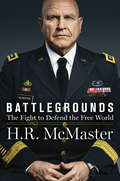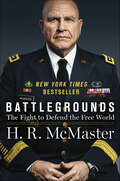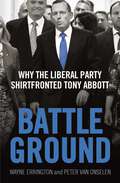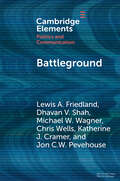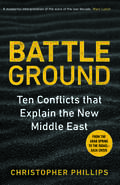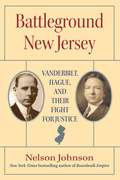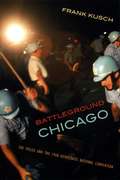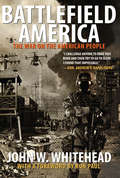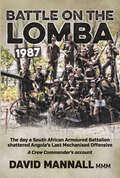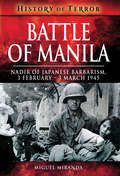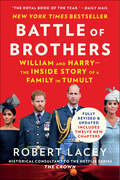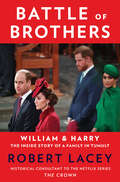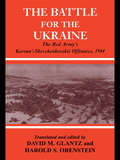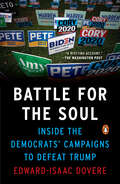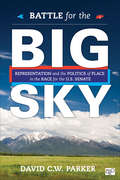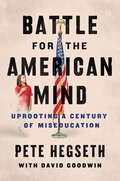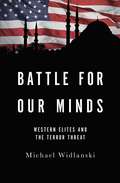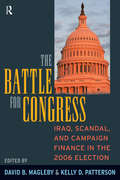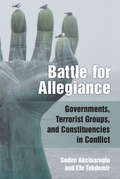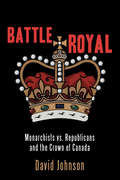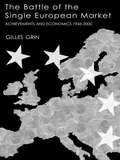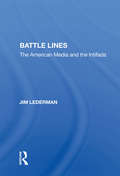- Table View
- List View
Battlegrounds: The Fight to Defend the Free World
by H. R. McMasterFrom Lt. General H.R. McMaster, U.S. Army, ret., the former National Security Advisor and author of the bestselling classic Dereliction of Duty, comes a bold and provocative re-examination of the most critical foreign policy and national security challenges that face the United States, and an urgent call to compete to preserve America’s standing and security.Across multiple administrations since the end of the Cold War, American foreign policy has been misconceived, inconsistent, and poorly implemented. As a result, America and the free world have fallen behind rivals in power and influence. Meanwhile threats to security, freedom, and prosperity, such as nuclear proliferation and jihadist terrorism have grown. In BATTLEGROUNDS, H.R. McMaster describes efforts to reassess and fundamentally shift policies while he was National Security Advisor. And he provides a clear pathway forward to improve strategic competence and prevail in complex competitions against our adversaries. <P><P>BATTLEGROUNDS is a groundbreaking reassessment of America’s place in the world, drawing from McMaster’s long engagement with these issues, including 34 years of service in the U.S. Army with multiple tours of duty in battlegrounds overseas and his 13 months as National Security Advisor in the Trump White House. It is also a powerful call for Americans and citizens of the free world to transcend the vitriol of partisan political discourse, better educate themselves about the most significant challenges to national and international security and work together to secure peace and prosperity for future generations. <P><P><b>A New York Times Bestseller</b>
Battlegrounds: The Fight to Defend the Free World
by H. R. McMasterThe former National Security Advisor's New York Times bestselling critique of US foreign policy—with new material on the Jan. 6th assault on the Capitol. In Battlegrounds, Lt. General H.R. McMaster, U.S. Army, ret., the former National Security Advisor under President Trump, delivers a bold re-examination of the most critical foreign policy and national security challenges facing the United States. In this new edition, McMaster addresses the January 2021 assault on the U.S. Capitol and discusses how citizens across the free world can work together to restore confidence in democratic institutions.According to McMaster, American foreign policy has been misconceived and poorly implemented since the end of the Cold War. This has allowed threats to security, freedom, and prosperity—such as nuclear proliferation and jihadist terrorism—to grow. As National Security Advisor, he pursued course correction through a fundamental shift in policy. Now he provides a clear path to improving strategic competence and prevailing in complex competitions against our adversaries.Calling on all Americans to rise above the vitriol of partisan discourse, McMaster stresses the importance of educating ourselves about the national and international security challenges we face. Only then can we work together to secure peace and prosperity for future generations.
Battleground: Why the Liberal Party Shirtfronted Tony Abbott
by Wayne Errington Peter van OnselenTony Abbott came to office lauded as the most effective leader of the opposition since Whitlam, but the signs of an imperfect transition to the prime ministership would soon emerge. Why did Abbott fail to grow into the job to which he had aspired for decades? Backbenchers complained about the leader's office, the lack of access, front benchers leaked about cabinet processes to the media. His long apprenticeship in religion, journalism and political life prepared him for neither the mundane business of people management nor the commanding heights of national leadership. Public goodwill evaporated after a tough first budget the government failed to explain. Inside the Liberal party individual ambitions and a succession of poor polls produced increasing concern that the next election was lost. As a result, the horse named self-interest won yet again.
Battleground: Asymmetric Communication Ecologies and the Erosion of Civil Society in Wisconsin (Elements in Politics and Communication)
by Dhavan V. Shah Katherine J. Cramer Lewis A. Friedland Michael W. Wagner Chris Wells Jon PevehouseBattleground models Wisconsin's contentious political communication ecology: the way that politics, social life, and communication intersect and create conditions of polarization and democratic decline. Drawing from 10 years of interviews, news and social media content, and state-wide surveys, we combine qualitative and computational analysis with time-series and multi-level modeling to study this hybrid communication system – an approach that yields unique insights about nationalization, social structure, conventional discourses, and the lifeworld. We explore these concepts through case studies of immigration, healthcare, and economic development, concluding that despite nationalization, distinct state-level effects vary by issue as partisan actors exert their discursive power.
Battleground: 10 Conflicts that Explain the New Middle East
by Christopher PhillipsThe essential guide to geopolitics in the modern Middle East The Middle East is in crisis. The shocking events of the war in Gaza have rocked the entire region. More than a decade ago, the Arab Spring had raised hopes of a new beginning but instead ushered in a series of civil wars, coups, and even harsher autocracies. Tensions were exacerbated by the meddling of outsiders, as regional and global powers sought to further their interests. The United States, for so long the dominant actor, had stepped back, leaving a vacuum behind it to be fought over. Christopher Phillips explores geopolitical rivalries in the region, and the major external powers vying for influence: Russia, China, the EU, and the US. Moving through ten key flashpoints, from Syria to Palestine, Phillips argues that the United States&’ overextension after the Cold War, and retreat in the 2010s, has imbalanced the region. Today, the Middle East remains blighted by conflicts of unprecedented violence and a post-American scramble for power – leaving its fate in the balance.
Battleground New Jersey: Vanderbilt, Hague and Their Fight for Justice (Rivergate Regionals Collection)
by Nelson JohnsonNew Jersey's legal system was plagued with injustices from the time it was established through the mid-twentieth century. Nelson Johnson chronicles how the system was finally reformed through the dramatic stories of two very different men, Arthur T. Vanderbilt and Frank Hague, two of the most powerful American politicians of their time. Their battles eventually led to legal reform, transforming New Jersey's court system into one of the most highly regarded in the nation.
Battleground Chicago: The Police and the 1968 Democratic National Convention
by Frank KuschBattleground Chicago ventures beyond the stereotypical image of rioting protesters and violent cops to re-evaluate exactly how and why the police attacked anti-war activists at the 1968 Democratic convention.
Battlefield America: The War On the American People
by John W. WhiteheadIn Battlefield America: The War on the American People, the follow-up to his award-winning book A Government of Wolves: The Emerging American Police State, constitutional attorney John W. Whitehead paints a terrifying portrait of a nation at war with itself and which is on the verge of undermining the basic freedoms guaranteed to the citizenry in the Constitution.<P><P>Indeed, police have been transformed into extensions of the military, towns and cities have become battlefields, and the American people have been turned into enemy combatants, to be spied on, tracked, scanned, frisked, searched, subjected to all manner of intrusions, intimidated, invaded, raided, manhandled, censored, silenced, shot at, locked up, and denied due process. Yet this police state did not come about overnight. As Whitehead notes, this shift into totalitarianism cannot be traced back to a single individual or event. Rather, the evolution has been so subtle that most American citizens were hardly even aware of it taking place. Yet little by little, police authority expanded, one weapon after another was added to the police arsenal, and one exception after another was made to the standards that have historically restrained police authority. Add to this mix the merger of Internet megacorporations with government intelligence agencies, and you have the making of an electronic concentration camp that not only sees the citizenry as databits but will attempt to control every aspect of their lives. And if someone dares to step out of line, they will most likely find an armed SWAT team at their door.
Battlefield America: The War On The American People
by Ron Paul John W. WhiteheadPolice forces across the United States have been transformed into extensions of the military. Our towns and cities have become battlefields, and we the American people are now the enemy combatants to be spied on, tracked, frisked, and searched. For those who resist, the consequences can be a one-way trip to jail, or even death. Battlefield America: The War on the American People is constitutional attorney John W. Whitehead's terrifying portrait of a nation at war with itself. In exchange for safe schools and lower crime rates, we have opened the doors to militarized police, zero tolerance policies in schools, and SWAT team raids. The insidious shift was so subtle that most of us had no idea it was happening. This follow-up to Whitehead's award-winning A Government of Wolves, is a brutal critique of an America on the verge of destroying the very freedoms that define it. Hands up!-the police state has arrived.
Battle on the Lomba 1987: A Crew Commander's Account
by David MannallA South African national serviceman recounts becoming a soldier and an ensuing David-and-Goliath face-off against Angolan armed forces in 1987.The climactic death-throes of Soviet Communism during the 1980s included a last-gasp attempt at strategic franchise expansion in southern Africa. Channeled through Castro’s Cuba, oil-rich Angolan armed forces (FAPLA) received billions of dollars of advanced weaponry and thousands of armored vehicles. Their intent: to eradicate the US-backed Angolan opposition (UNITA), then push southwards into South Africa’s protectorate SWA/Namibia, ostensibly as liberators.1985 saw the first large-scale mechanized offensive in southern African history. Russian Generals planned and oversaw the offensive but didn’t account for the tenacity of UNITA (supported by the South African Defense Forces, SADF) or the rainy season. The ‘85 offensive floundered in the mud, and FAPLA returned to their capital Luanda. The South Africans stood down, confident their “covert” support for UNITA had demonstrated the folly of prosecuting war so far from home against Africa’s military Superpower. However, they were mistaken. Fidel and FAPLA immediately redoubled their efforts, strengthening fifteen battalions with even more Soviet hardware while Russian and Cuban specialists oversaw troop training.As Cuban and Angolan fighter pilots honed their skills over the skies of Northern Angola, David Mannall, a normal seventeen-year-old kid completing high school, was preparing for two years of compulsory military service before beginning Tertiary education. Through a series of fateful twists, he found himself leading soldiers in several full-scale armored clashes, including the largest and most decisive battle on African soil since World War II.This is a David and Goliath story that has never been truthfully told. The author reveals how Charlie Squadron, comprising just twelve 90mm AFVs crewed by thirty-six national servicemen, as part of the elite sixty-one Mechanized Battalion, engaged and effectively annihilated the giant FAPLA 47th Armored Brigade in one day—3 October 1987. Their 90mm cannons were never designed as tank-killers, but any assurances that it would never be used against heavy armor were left in the classroom during the three-month operation and never more starkly than the decisive “Battle on The Lomba River.” The Communist-backed offensive died that day along with hundreds of opposition fighters.47th Brigade survivors abandoned their remaining equipment, eventually joining the 59th Brigade in what became a full-scale retreat of over ten thousand soldiers to Cuito Cuanevale. The myth perpetuated by post-apartheid politicians goes something like this: “The SADF force that destroyed 47th Brigade on 3 October numbered 6,000 men and that all the hard yards were run by the long-suffering UNITA!” The inconvenient truth is that there were just 36 South African boys on the frontline that day, but it is also true to say they would never have achieved such a stunning victory without the support of many more. This is their story.
Battle of Manila: Nadir of Japanese Barbarism, 3 February–3 March 1945 (History of Terror)
by Miguel MirandaThis &“extensively researched and well-illustrated&” history recounts the bloody fight to liberate Manila from occupation during WWII (WWII History Magazine). For nearly four years during the Second World War, Japanese occupation had devastated the Philippines. Then, in 1944, General MacArthur led a massive army of American and Filipino forces determined to take back the island nation. Essential to the Philippine Campaign was recapturing the country&’s once-glittering capital city, Manila. In late January of 1945, the Allied forces embarked on the necessary and urgent mission. Trapped within the old University of Santo Tomas were thousands of ailing prisoners at risk of torture and death by their captors. As the desperate Japanese navy fought to keep the advancing Americans at bay, Japanese troops began killing civilians caught in the crossfire—or using them as human shields. Thousands of Filipinos were trapped in what became the most bitter combat seen in the Pacific Theater.
Battle of Brothers: William and Harry—the Inside Story of a Family in Tumult
by Robert LaceyA New York Times bestseller.From bestselling author and historical consultant to the award-winning Netflix series The Crown, an unparalleled insider account of tumult, secrecy and schism in the Royal family.The world has watched Prince William and Prince Harry since they were born. Raised by Princess Diana to be the closest of brothers, how have the boy princes grown into very different, now distanced men?From royal insider, biographer and historian Robert Lacey, this book reveals the untold details of William and Harry’s closeness and estrangement, asking what happens when two sons are raised for vastly different futures – one burdened with the responsibility of one day becoming king, the other with the knowledge that he will always remain spare. How have William and Harry both agreed and diverged in their views of what a modern royal owes to their country? Were the seeds of damage sowed by Prince Charles and Princess Diana as their marriage unraveled for all the world to see? In the previous generation, how have Prince Charles and Prince Andrew’s own relations strained under the Crown? What role has Queen Elizabeth II played in marshalling her feuding heirs? What parts have Kate Middleton and Meghan Markle played in helping their husbands to choose their differing paths? And what is the real, unvarnished story behind Harry and Meghan’s dramatic departure?In the most intimate vision yet of life behind closed doors, with its highs, lows and discretions all laid out, this is a journey into royal life as never offered before.
Battle of Brothers: William and Harry – The Inside Story of a Family in Tumult
by Robert LaceyFrom bestselling author and historical consultant to the award-winning Netflix series The Crown, an unparalleled insider account of tumult, secrecy and schism in the Royal family. The world has watched Prince William and Prince Harry since they were born. Raised by Princess Diana to be the closest of brothers, how have the boy princes grown into very different, now distanced men? <P><P>From royal insider, biographer and historian Robert Lacey, this book reveals the untold details of William and Harry’s closeness and estrangement, asking what happens when two sons are raised for vastly different futures – one burdened with the responsibility of one day becoming king, the other with the knowledge that he will always remain spare. How have William and Harry both agreed and diverged in their views of what a modern royal owes to their country? Were the seeds of damage sowed by Prince Charles and Princess Diana as their marriage unraveled for all the world to see? In the previous generation, how have Prince Charles and Prince Andrew’s own relations strained under the Crown? What role has Queen Elizabeth II played in marshalling her feuding heirs? What parts have Kate Middleton and Meghan Markle played in helping their husbands to choose their differing paths? And what is the real, unvarnished story behind Harry and Meghan’s dramatic departure? In the most intimate vision yet of life behind closed doors, with its highs, lows and discretions all laid out, this is a journey into royal life as never offered before. <P><P><b>A New York Times Bestseller</b>
Battle for the Ukraine: The Korsun'-Shevchenkovskii Operation (Soviet (Russian) Study of War)
by Harold S. Orenstein David M. GlantzA comprehensive guide to the battle for the Ukraine from the Soviet perspective during the winter of 1943-1944. This volume is an unexpurgated translation of the originally classified Soviet General Staff Study No.14.
Battle for the Soul: Inside the Democrats' Campaigns to Defeat Trump
by Edward-Isaac DovereAn award-winning political journalist for The Atlantic tells the inside story of how the embattled Democratic party, seeking a direction for its future during the Trump years, successfully regained the White House.The 2020 presidential campaign was a defining moment for America. As Donald Trump and his nativist populism cowed the Republican Party into submission, many Democrats—haunted by Hillary Clinton&’s shocking loss in 2016, which led to a four-year-long identity crisis—were convinced he would be unbeatable. Their party and the country, it seemed, might never recover. How, then, did Democrats manage to win the presidency, especially after the longest primary race and the biggest field ever? How did they keep themselves united through an internal struggle between newly empowered progressives and establishment forces—playing out against a pandemic, an economic crisis, and a new racial reckoning? Edward-Isaac Dovere&’s Battle for the Soul is the searing, fly-on-the-wall account of the Democrats&’ journey through recalibration and rebirth. Dovere traces this process from the early days in the wilderness of the post-Obama era, though the jockeying of potential candidates, to the backroom battles and exhausting campaigns, to the unlikely triumph of the man few expected to win, and through the inauguration and insurrection at the Capitol. Dovere draws on years of on-the-ground reporting and contemporaneous conversations with the key players—whether in Pete Buttigieg&’s hotel suite in Des Moines an hour before he won the Iowa caucuses or Joe Biden&’s first-ever interview in the Oval Office—as well as aides, advisors, and voters. With unparalleled access and an insider&’s command of the campaign, Battle for the Soul offers a compelling look at the policies, politics, people and the often absurd process of running for president. This fresh and timely story brings you on the trail, into the private rooms and along to eavesdrop on critical conversations. You will never see campaigns or this turning point in our history the same way again.
Battle for the Big Sky: Representation and the Politics of Place in the Race for the US Senate
by David C. ParkerBattle for the Big Sky delves into one of the few competitive races of the 2012 election: the US Senate campaign in Montana. Author David C.W. Parker was granted exceptional access by both candidates over the 21 months preceding the election, allowing him to tell the story of the race in rare and fascinating detail, while also exploring the impact of Citizens United and so-called "dark money" on the campaign. The Montana setting offers readers a view into the rising political influence of the West, the importance of "place" in politics, and the impact of congressional styles and constituent relationships on campaigns and elections. Parker skillfully weaves political analysis into his narrative and places the race in the broader context of congressional elections and the research literature.
Battle for the Big Sky: Representation and the Politics of Place in the Race for the US Senate
by David C. ParkerBattle for the Big Sky delves into one of the few competitive races of the 2012 election: the US Senate campaign in Montana. Author David C.W. Parker was granted exceptional access by both candidates over the 21 months preceding the election, allowing him to tell the story of the race in rare and fascinating detail, while also exploring the impact of Citizens United and so-called "dark money" on the campaign. The Montana setting offers readers a view into the rising political influence of the West, the importance of "place" in politics, and the impact of congressional styles and constituent relationships on campaigns and elections. Parker skillfully weaves political analysis into his narrative and places the race in the broader context of congressional elections and the research literature.
Battle for the American Mind: Uprooting a Century of Miseducation
by Pete Hegseth David GoodwinNew York Times bestselling author and FOX News host Pete Hegseth is back with what he says is his most important book yet: A revolutionary road map to saving our children from leftist indoctrination. <p><p>Behind a smokescreen of “preparing students for the new industrial economy,” early progressives had political control in mind. America’s original schools didn’t just make kids memorize facts or learn skills; they taught them to think freely and arrive at wisdom. They assigned the classics, inspired love of God and country, and raised future citizens that changed the world forever. <p><p>Today, after 16,000 hours of K-12 indoctrination, our kids come out of government schools hating America. They roll their eyes at religion and disdain our history. We spend more money on education than ever, but kids can barely read and write—let alone reason with discernment. Western culture is on the ropes. Kids are bored and aimless, flailing for purpose in a system that says racial and gender identity is everything. <p><p>Battle for the American Mind is the untold story of the Progressive plan to neutralize the basis of our Republic – by removing the one ingredient that had sustained Western Civilization for thousands of years. Pete Hegseth and David Goodwin explain why, no matter what political skirmishes conservatives win, progressives are winning the war—and control the “supply lines” of future citizens. Reversing this reality will require parents to radically reorient their children’s education; even most homeschooling and Christian schooling are infused with progressive assumptions. We need to recover a lost philosophy of education – grounded in virtue and excellence – that can arm future generations to fight for freedom. It’s called classical Christian education. Never heard of it? You’re not alone. <p><p>Battle for the American Mind is more than a book; it’s a field guide for remaking school in the United States. We’ve ceded our kids’ minds to the left for far too long—this book gives patriotic parents the ammunition to join an insurgency that gives America a fighting chance. <p> <b>New York Times Bestseller</b>
Battle for Our Minds: Western Elites and the Terror Threat
by Michael WidlanskiAfter thousands of people were murdered in simultaneous terror attacks on September 11, 2001, the New York Times said the violence came "out of the blue." Nothing could have been further from the truth. Arab-Islamic terrorists had been attacking the West for years but the reports were dismissed as the work of "madmen" and, in fact, all the while recruiters and fund-raisers for Arab-Islamic terror were receiving academic and economic sanctuary in some of America's most esteemed institutions. Had Osama bin Laden been held accountable in 1992, 1996, and 1998, and had his followers been called out, his Al-Qaeda network wouldn't have become a clarion call for anti-Western terror. Now as new attacks, aborted and otherwise, are carried out from London to Mumbai to New York's Times Square, Western elites--academia, the media, and government officials--have once again been fueling that same dangerous complacency that is leaving us as vulnerable as before. In Battle for Our Minds, Michael Widlanski delivers a powerful and sound argument for turning around this willful ignorance, and explains exactly how it can be done: by facing and genuinely understanding the precise motives and mind games behind those who want to destroy us. He names the officials, media pundits, and academics who have hindered the battle against Islamic terror, in turn obstructing a logical fight to stop it. Clearly, a lack of factual accuracy is sabotaging the Western mind, and Widlanski's anger is justified: Why has an all-out "holy war" been softened into the more liberally acceptable "spiritual struggle"? Why, pre-9/11, were the terrorist threats made in New York City mosques ignored? Why did we go out of our way to give bin Laden a proper burial out of respect to an ideology that erased the World Trade Center? Why is President Barack Obama so hesitant to offend the enemy by calling it what it is: Islamic Extremist Terror? How can we stop it if, out of a weak and outrageous political correctness, we refuse to even recognize it? Dr. Widlanski lays out a commonsense, no-holds-barred solution to an imperative and increasingly dangerous global dilemma. This is not a witch hunt, nor a temporary Band-Aid, but a comprehensive strategy built around a hard-hitting truth carefully omitted from every liberal media outlet, and downplayed, overlooked, and incorrectly assessed by the FBI, CIA, and the State Department: terrorist "martyrs" want to change the course of history. By convincing them that their acts are futile, the tide turns and we can prevent further acts--and win the battle for our minds. *** IGNORING OR BELITTLING THE EXTREMIST IDEOLOGIES SPARKING TERRORISM IS ITSELF AN IDEOLOGY-- THE WESTERN IDEOLOGY OF POLITICAL CORRECTNESS. THIS IDEOLOGY HAS ALREADY COST MANY LIVES. Several European leaders have recently shown that they are moving away from the politically correct path that avoids criticizing Islamic extremism and instead has enshrined it as part of multiculturalism. German chancellor Angela Merkel, French president Nikolas Sarkozy, and British prime minister David Cameron, all of whom have large Muslim minorities in their countries, have now said that that path is a dead end. After the London bombings then-prime minister Tony Blair said the war with Arab-Islamic terror was a battle whose roots were ideological: "This is the battle that must be won, a battle not just about the terrorist methods but their views. Not just their barbaric acts, but their barbaric ideas. Not only what they do but what they think and the thinking they would impose on others." Fortunately, a growing number of Western leaders is starting to recognize ideology as a key to Arab-Islamic terror. To fight terror we need also to combat these ideological motivators directly in what has sometimes been called "the battle of ideas."
Battle for Congress: Iraq, Scandal, and Campaign Finance in the 2006 Election
by David B. Magleby Kelly D. PattersonJust in time for the coming election year, this book looks at the changing of the guard in 2006 and speculates on where the system may be heading in 2008. It provides an in-depth examination of the ways in which candidates, interest groups, and parties perceived their opportunities and allocated their campaign resources during the midterm elections. The role of money, which was influenced by campaign finance reform, is a special focus in this book. The theme of political scandal has frequently raised concerns that Republican leadership had become a "culture of corruption" that had flourished under their watch, which is also addressed in this book. The war in Iraq, however, may be the most important factor-not only in the 2006 battle for Congress, but for the 2008 battle for the White House as well.
Battle for Bed-Stuy: The Long War on Poverty in New York City
by Michael WoodsworthIn the 1960s Brooklyn's Bedford-Stuyvesant neighborhood was labeled America's largest ghetto. But its brownstones housed a coterie of black professionals intent on bringing order and hope to the community. In telling their story Michael Woodsworth reinterprets the War on Poverty by revealing its roots in local activism and policy experiments.
Battle for Allegiance: Governments, Terrorist Groups, and Constituencies in Conflict
by Seden Akcinaroglu Efe TokdemirDomestic terrorist groups, like all violent nonstate actors, compete with governments for their monopoly on violence and their legitimacy in representing the citizenry. Battle for Allegiance shows violence is neither the only nor the most effective way in which nonstate actors and governments work to achieve their goals. As much as nonviolent strategies are a rarely considered piece of the puzzle, the role of the audience is another crucial piece often downplayed in the literature. Many studies emphasize the interactions between the government and the terrorist group at the expense of the constituency, but the constituency is the common cluster for both actors to gain legitimacy and to demand its allegiance. In fact, the competition between the two actors goes far beyond who is superior in terms of military force and tactics. The hardest battles are fought over the allegiance of the citizens. Using a multimethod approach based on exclusive interviews and focus groups from Turkey and large N original data from around the world, Seden Akcinaroglu and Efe Tokdemir present the first systematic empirical analysis of the ways in which terrorist groups, the government, and the citizens relate to each other in a triadic web of action. They study the nonviolent actions of terrorist groups toward their constituencies, the nonviolent actions of governments toward terrorists, and the nonviolent actions of governments toward the terrorist group’s constituencies. By investigating the causes, targets, and consequences of accommodative actions, this book sheds light on an important, but generally ignored, aspect of terrorism: interactive nonviolent strategies.
Battle Royal: Monarchists vs. Republicans and the Crown of Canada
by David JohnsonWhat is the future of the monarchy in Canada? A strong republican movement in Canada stresses that the monarchy is archaic and anti-democratic, an embarrassing vestige of our colonial past. An equally vibrant monarchist movement, however, defends its loyalty to royalty, asserting that the Queen is a living link to a political and constitutional tradition dating back over a thousand years. But is the monarchy worth keeping? Battle Royal answers this question and many more: What does the Queen really do? What are the powers of the governor general? Has the Crown strengthened or weakened Canadian democracy? If we abolish the monarchy, what do we replace it with? And will we have to re-open the constitution? Charles will soon become King of Canada, but a Canada highly ambivalent to his reign. This presents the representatives of the Crown with the opportunity to build a better monarchy in both Britain and Canada, one relevant to the twenty-first century.
Battle Of Single European Market
by GrinFirst published in 2004. Routledge is an imprint of Taylor & Francis, an informa company.
Battle Lines: The American Media And The Intifada
by Jim LedermanThis book is about the intifada, the popular Palestinian uprising in the Israeli-occupied territories, broadcasted by television to an audience of millions. It explores what happens in a democracy when a government faces a major political crisis with potentially damaging international implications.
